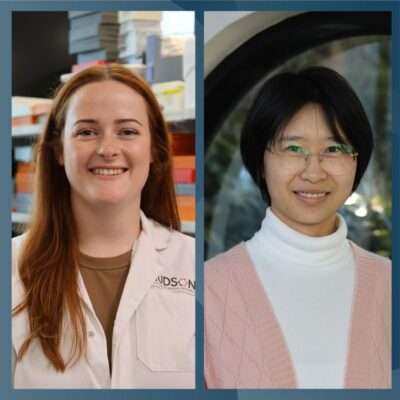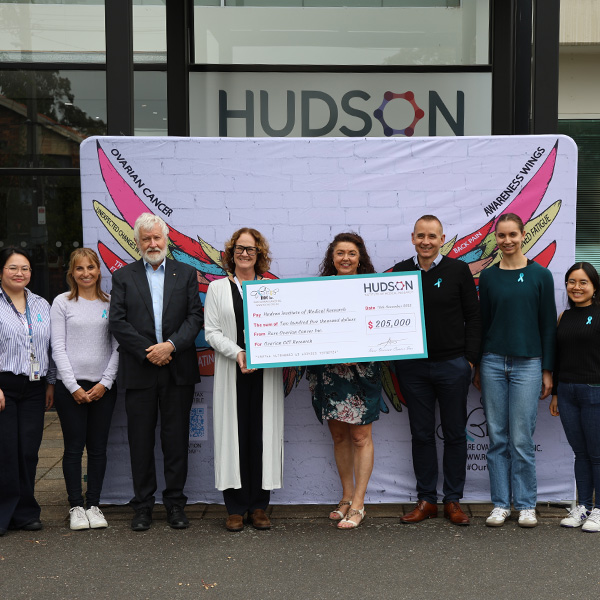Soy molecule may lead to new anti-inflammatory drug
By Rob Clancy, staff writer. Reviewed by Associate Professor Michael Gantier

A naturally occurring molecule found in soy products could hold the clue to a new class of potent anti-inflammatory drugs, targeting diseases ranging from heart conditions to inflammatory bowel disease (IBD).
Inflammation is a leading cause of many diseases – and half of all deaths – but current anti-inflammatory drugs have harmful side effects.
Hudson Institute of Medical Research has uncovered the secrets of a natural molecule, found in soy products, that could be the key to a new, safer class of treatments, offering relief to millions of people suffering from diseases including
| Acute kidney injury | COVID-19 | Liver disease | Osteoporosis | Polyarthritis |
| Acute pancreatitis | Heart conditions | Lupus | Overnutrition-induced obesity | Sepsis/septic shock |
| Age dependent macular degeneration | Hepatitis B | Motor-neurone disease (MND) | Parkinson’s disease | Sickle cell disease |
| Chronic obstructive pulmonary disease | Inflammatory bowel disease (IBD) | Non-alcoholic steatohepatitis (NASH) | Pneumonia | Type 2 diabetes |
Soy anti-inflammatory effects
Associate Professor Michael Gantier, whose work has recently been published in the journal mBio, says this soy molecule is already used to help limit osteoporosis, but we have now found a mechanism explaining its broad anti-inflammatory effects.
“Genistein is known to have many beneficial therapeutic properties including protection against osteoporosis, reduction in the risk of cardiovascular disease, alleviation of postmenopausal symptoms and anti-cancer properties,” A/Prof Gantier says.
Key points
-
- The molecule Genistein is found in soy products.
- It’s already used to treat osteoporosis.
- Hudson researchers have uncovered the key to its anti-inflammatory properties.
- It has the potential to treat numerous illnesses and create vaccines with fewer side-effects.
- Work is now under way with Noxopharm on a new class of drug using a related compound.
“As such, populations which rely on high levels of soy and fermented soy bean products are associated with a lower incidence of all these diseases.
“The problem is, until now we did not fully understand how Genistein provided this protection.”
A Prof Gantier and his team have now discovered that Genistein inhibits an inflammatory pathway at the root cause of many diseases: the STING pathway.
The STING pathway is activated in organs that are damaged, triggering potent hormone-like molecules of the immune system. For example, STING has recently been found to be a key driver of disease in severe COVID-19 patients.
Potent, yet safe anti-inflammatory compounds
“Our team’s findings illustrate that molecules of this family could be used to develop potent, yet safe anti-inflammatory compounds,” says A Prof Gantier.
Hudson Institute is now using knowledge of the anti-inflammatory effect of this naturally occurring molecule found in soy products in collaboration with Biotech company Noxopharm and its chemists with unique expertise in Genistein-like molecules.
This has led to the discovery that Idronoxil, a synthetic compound closely related to Genistein, which is more than 10 times more potent that Genistein at blocking the STING pathway.
In a pre-print study, Hudson Institute’s team, in collaboration with Monash University, University of Technology Sydney and Noxopharm, demonstrated that Idronoxil was protective against severe COVID-19 inflammation in a pre-clinical model of the disease.
Collaborators | Monash University
Journal | Molecular and Cellular Biology
Title | Genistein Targets STING-Driven Antiviral Responses
View publication | https://doi.org/10.1128/mbio.02064-22
- Inflammation
- Inflammation and cancer
- COVID-19
- Inflammatory bowel disease (IBD)
- Pneumonia
- Osteoporosis
- Lupus
In this article
About Hudson Institute
Hudson Institute’ s research programs deliver in three areas of medical need – inflammation, cancer, women’s and newborn health. More
Hudson News
Get the inside view on discoveries and patient stories
“Thank you Hudson Institute researchers. Your work brings such hope to all women with ovarian cancer knowing that potentially women in the future won't have to go through what we have!”





